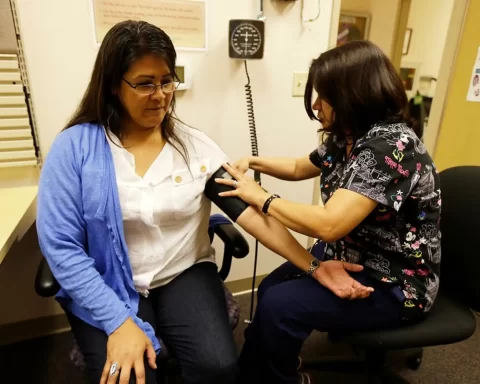New Delhi, December 30: A diabetic can eat avocado every day. It’s high in fibre and low in fat, making it an ideal food for diabetics. However, consuming avocado daily is only a small part of other measures for diabetes control.
Diabetes is an increasingly common condition, fanned by spiralling obesity rates, sedentary lifestyles, and an aging population.
Type 2 diabetes (T2D) affects 10.5% of the world’s adult population, over 50% of whom remain unaware that they are living with the condition. In recent decades, Type 2 diabetes prevalence has increased significantly, especially in developing countries.
The International Diabetes Federation (IDF) predicts that the global prevalence of Type 2 diabetes will increase by 46% by 2045, thus projected to affect approximately 783 million adults worldwide.
Ninety per cent of people with it have type 2 among the diabetes type 1 and type 2, which can be hereditary but is often triggered by a sedentary lifestyle and poor diet. The condition causes a person’s blood sugar to become too high – essentially an inability of the body to break down glucose levels.
It increases the risk of stroke, heart disease, high blood pressure, narrowing of blood vessels and nerve damage. Figures reveal around 2.4 million people are at ‘high risk’ of type 2 diabetes, with an alarming increase among the under-40s.
Now, a recent study has shown there is a certain fruit that may be able to slash your risk of developing type 2 diabetes – the avocado.
Avocados, while known for their buttery feel and distinctive taste, are a powerhouse of nutrients. Many studies link avocado consumption with good heart health, eye health, and weight management. Avocado is also good for diabetes control.
Avocado Nutritional Information
| Nutrition | Amount (per 100g) |
| Calories | 160 calories |
| Protein | 1.34g |
| Fat | 17.0g |
| Carbohydrate | 0.06g |
| Dietary Fibre | 3.86g |
| Potassium | 485mg |
| Magnesium | 29mg |
| Choline | 14.2mg |
| Vitamin E | 2.07 mg |
| Vitamin B-5 | 1.39mg |
| Copper | 0.19mg |
| Vitamin C | 10mg |
| Vitamin B3 | 1.74mg |
| Zinc | 0.64mg |
| Vitamin B-6 | 0.26mg |
| Manganese | 0.14mg |
| Vitamin B-2 | 0.13mg |
| Vitamin B-1 | 0.07mg |
| Folate | 81mcg |
| Vitamin K | 21mcg |
| Vitamin A | 7mcg |
Data analysed from more than 6,000 adults aged 45 to 84, revealed a potential link between eating the popular breakfast fruit and a reduced risk of type 2 diabetes – particularly in those displaying an ‘avocado intake biomarker’ in their blood. Published in The Journal of Nutrition, the findings suggest that our metabolic processes may play a significant role in influencing our overall health.
In the analysis of 6,224 older adults, researchers focused on the correlation between avocado intake, fasting blood sugar, and insulin levels. Specifically, they examined avocado-specific ‘metabolites’ (a substance produced during metabolism) in the blood, which show up when someone has eaten an avocado. The results suggested the fruit might positively influence blood sugar balance for certain individuals, though not necessarily for everyone.
This study aligns with prior research emphasising the positive impact of avocados on type 2 diabetes risk. Earlier this year, a study conducted at Baylor College of Medicine explored the relationship between eating avocados and the likelihood of developing diabetes. Dr Alexis Wood, assistant professor of pediatrics-nutrition, expressed interest in identifying easily accessible and popular foods to incorporate into diets for managing and preventing type 2 diabetes.
Published in the Journal of Diabetes Mellitus, the Baylor study used existing data from a large population of Hispanic adults in the United States. Participants were categorised as avocado consumers or non-consumers based on reported dietary habits over two typical days.
The research found a 20 per cent reduction in the risk of developing type 2 diabetes over a six-year period among those who munched on avocados. Additionally, the fruit was associated with positive effects on weight loss and cholesterol levels, attributed to the presence of monounsaturated fats that contribute to prolonged feelings of fullness and help maintain healthy HDL cholesterol while reducing LDL cholesterol levels in the bloodstream.
What are the two types of diabetes?
Type one is when the body’s immune system attacks and destroys the cells that produce insulin.
Type two is the most common, and it’s when the body doesn’t produce enough insulin, or the body’s cells fail to react to insulin. This one is considered the easier to manage of the two.
Symptoms
Increased thirst and frequent urination:
Excessive thirst (polydipsia) and increased urination (polyuria) are common symptoms. The body tries to get rid of the excess sugar in the blood by increasing urine production, leading to dehydration.
Unexplained weight loss or gain:
Despite eating more, there may be unexplained weight loss. On the other hand, some people with type 2 diabetes may experience weight gain.
Increased hunger:
You may feel hungrier than usual, even after eating.
Fatigue:
A lack of energy and persistent fatigue are common symptoms.
Blurred vision:
High blood sugar levels can affect the fluid levels in the eyes, leading to blurred vision.
Slow healing of wounds:
Injuries and cuts may take longer to heal.
Frequent infections:
Individuals with diabetes may be more prone to infections, particularly in the skin, urinary tract, and gums.
Tingling or numbness in hands or feet:
Elevated blood sugar levels over time can damage nerves, leading to a tingling or numb sensation, especially in the extremities.
Darkened skin patches:
A condition called acanthosis nigricans may cause dark, velvety patches of skin, often in the neck, armpits, or groin area.
Yeast infections:
Women with diabetes may experience more frequent yeast infections.
It’s important to note that some people with type 2 diabetes may not experience noticeable symptoms, especially in the early stages.





